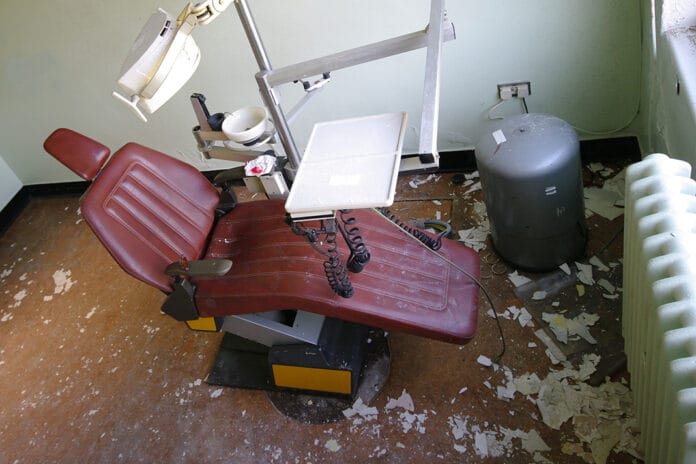Dental hygienists have spent years to be able to meet and maintain the educational standards and skills required to practice dentistry. We have been trained in infection control, oral and systemic disease processes, and proper instrumentation, among other things.
However, an industry known as “street dentistry” exists outside our world of rigorous safety protocols. For some, it means, quite literally, to practice out on the streets. For others, it’s more underground – hidden behind closed doors, in the patient’s home, or in a makeshift office. It’s a cheaper yet very risky option for those who can’t afford regulated dentistry. And while licensed dentistry is now the norm in many places across the globe, street dentistry still exists.
Since street dentistry is often performed in secret, we don’t definitively know how prevalent it is. However, enough illegal dentists have been discovered to know this is a widespread public health problem. Here is a look at some examples of modern street dentistry.
India
As of 2020, urban areas of India have a dentist-to-population ratio of 1:9,000. However, in rural areas, that ratio is 1:200,000.1 The lack of qualified providers and poor accessibility to dental clinics, especially in rural areas, in addition to high rates of poverty, illiteracy, high cost of dental treatment, and lack of oral health care literacy, have led many Indians to turn to street dentists.
Trained health care providers call street dentists in India “quacks.”2,3 A quack is “an unqualified person who falsely claims to have medical knowledge.”3 They work anywhere from setting up alongside a footpath or street to having well-furnished set-ups.2 Many claim to have learned dentistry from an ancestor or by watching a trained and licensed dentist while working as an assistant in a dental clinic.2,3
Common procedures are extractions using screwdrivers and pliers and the use of wires or self-curing resin to make removable partials permanent by fixing them to adjacent teeth.1 These procedures can lead to bone loss, tooth loss, infections, septicemia, and even death. The risk of oral cancer is increased due to constant irritation of ill-fitted partials and dentures and the use of carcinogenic materials for those seeking treatment from street dentists. Bloodborne infections such as hepatitis B and C and HIV/AIDS are a concern as proper infection control measures do not take place.3,4
The government, health ministry, and dental associations are taking initiatives to increase access to affordable care in rural areas.1 Dental professionals are trying to raise awareness of the dangers of seeking dental treatment through street dentists and urging the government to enact and enforce strict anti-quackery laws.4
Indonesia
Indonesia has universal health care, which includes general dentistry. However, the cost of orthodontics or cosmetic procedures is not currently covered, making cheaper options for orthodontics and veneers largely sought after, especially by those who cannot afford to seek treatment from trained and licensed dental professionals.5 Instead, many fall victim to informal dentists in hopes of improving their appearance for a minimal price.
Informal dentists without formal education or a license to practice dentistry are called Tukang Gigi, which means “tooth worker.”5 Most are believed to be self-taught, or their skills were passed down from generation to generation, though some claim they received non-medical training from dental worker unions.5,6 Informal dentists in Indonesia must register their practice and obtain a “dental worker permit” from the local health authority. However, they are only allowed to make and fit dentures and are strictly prohibited from performing other dental treatments and procedures, but this limitation is largely ignored.5
The rise of social media influencers and celebrities with straight, white teeth has left many Indonesians wanting to have perfect smiles, which is thought to have led to the surge in certain dental procedures by informal dentists. Some informal dentists have even hired social media influencers to promote their services.5
The Indonesian government tried to ban all informal dentistry in 2011, but the Informal Dentists’ Association countered by asking for a judicial review of the legislation. The constitutional court sided with the Informal Dentists’ Association and declared the law was against the constitution, which states that every Indonesian has the right to work.6
Reports by patients seeking dental care from informal dentists indicate a lack of infection control protocols and procedures. One man describes the setting as a “small and dingy” room with a “worn-out recliner chair perched next to a dirty bathroom.” The man goes on to explain that he was unaware if the equipment was sterilized and confirmed the informal dentist “did not wear a surgical mask or latex gloves.”5
Considering that HIV/AIDS and hepatitis B are substantial public health concerns in Indonesia, the lack of proper infection control among informal dentists is of great concern. Though in many countries, HIV prevalence is decreasing, in Indonesia, it is increasing.7 Additionally, The World Health Organization (WHO) has officially declared hepatitis B a health problem in Indonesia, further highlighting the need for proper infection control in dental settings to reduce the spread of infectious diseases.8
Botched dental treatment is more common than one might assume in Indonesia. One licensed dentist in Indonesia has shared over 900 cases of botched procedures by informal dentists.5
Botched orthodontic treatment can lead to gingival recession, root resorption, tissue trauma, malocclusion, and bone loss. Improperly placed veneers can also cause tissue trauma and bite issues. A rough margin could be a home for bacteria and a starting point for decay. Furthermore, any removal of enamel during orthodontics and veneers can cause sensitivity or even damage the pulp.
Though the Indonesian government has tried to manage the problem in the past, little has improved. Though there are no official figures, informal dentists are abundant in Indonesia and offer services that are not permitted despite the government’s attempt to limit the practice.
Morocco
Morocco is estimated to have up to 3,500 street dentists.9 The first formal school of dental medicine was established in 1981, leaving many street dentists with an advantage through established patients and reputations as well as the opportunity to provide care at a significantly reduced cost. Poverty and access to care issues are the main reasons people in Morocco are turning to street dentistry.9
One report of “street dentistry” describes the procedure being completed “under a ragged sunshade seated on plastic stools.”9 The street dentist had his 10-year-old son retrieve “cotton wool and aspirin” for a patient from the trunk of his car.9
Street dentistry is a family trade passed down from generation to generation. Street dentists are primarily “dental prosthetists” who claim to be dentists. In some cases, these “dental prosthetists” are former dental assistants who “learned the essentials on the job” or someone from a cleaning crew who worked in a dental clinic.9
Street dentists in Morocco provide services, including extractions and anesthesia, without any formal school or training. With a lack of facilities, it can be assumed that extractions are likely the most commonly provided treatment.9
Lack of infection control and surgical know-how undoubtedly leads to many complications, including death. A 12-year-old boy in Morocco died in 2016 from sepsis after having an extraction performed by an unlicensed dental worker.9 Despite the risk, those who can’t afford a licensed dentist still turn to street dentistry, where an extraction costs around five U.S. dollars.9
The Moroccan Ministry of Health publicly condemns unlicensed dentistry.9 However, the government is hesitant to enforce the ban on unlicensed dentistry because unlicensed dental tradespeople are a part of Morocco’s history and culture. Also, a ban would leave many citizens unemployed, which creates additional problems for the government. The government has provided no details on the steps to end the practice.9
Canada
Universal health care in Canada does not include most dental care; the cost of dentistry is comparable to that of the U.S.10,11 Unlicensed dentistry is a relatively rare occurrence in Canada because dental care in Canada is strictly regulated. However, this landscape may be changing as Canada has reported an expected shortage of dentists over the period spanning 2022-2031.12 Nonetheless, there are some documented cases of unlicensed dentists practicing illegally.
Unlike the other countries we’ve examined, illegal dentists in Canada don’t necessarily practice in the streets or back alleys. They must be extremely secretive to avoid arrest. Practices are often in the practitioner’s homes, and patients hear of these practices through word of mouth.13,14
Due to the expected shortage of dentists in Canada and multiple obstacles for foreign-trained dentists, the International Dentists Advanced Placement Program (IDAPP) was implemented in 2021. This six-month preparatory program allows foreign-trained dentists who graduated from a non-accredited program to gain entry into the Doctor of Dental Surgery program at the University of Toronto in year three of the 4-year program.15
The exclusive role of the program is to prepare foreign-trained dentists to take the examination of the National Dental Examining Board of Canada, which is required for certification. The program also offers English proficiency training and testing to help ensure there is no language barrier when testing for certification.15
In 2014, a man in Ontario was arrested for operating a dental practice in his basement.14 Among many wrongdoings, he had illegally installed an x-ray machine, which potentially exposed his patients to excess radiation. This man claimed to be a foreign-trained dentist who failed his Canadian dental exams due to a language barrier.
In 2013, a man was arrested in British Columbia for illegally practicing dentistry out of a bedroom in his house.10 The man claimed to have some dental training but was not licensed, and the conditions in his house were unsanitary. Officials estimated that he treated up to 450 patients. Authorities urged patients who were treated by this individual to be tested for bloodborne illnesses such as hepatitis and HIV.13
Though details of procedures offered and completed were not listed in both reported cases, the items seized included scalpel blades, high-speed dental handpieces, dental implants, needles, local anesthetic, and x-ray equipment. Further, it was noted that the areas being utilized for treatment in both the above-mentioned cases were “filthy,” and there was no clear sign that infection control measures were taken.13,14
In Canada, practicing dentistry without a license is punishable by jail time and fines. However, in the case that occurred in Ontario, the individual received 90 days of house arrest.13,14 Practicing dental hygiene without a license or misrepresenting yourself as a licensed dental hygienist is punishable by fines up to $25,000 for the first offense and up to $50,000 for the second offense.16
United States
While legal dentistry is widely available in the United States compared to other countries, there is still access to care issues. In addition, many Americans do not have dental insurance. Even people with insurance can struggle to pay the out-of-pocket expenses for their treatment. Like Canada, street dentistry in the United States is rare compared to other countries, but it does happen and puts the public at risk.
In April 2023, a man was arrested in Connecticut for illegally dispensing drugs and performing unlicensed dental work in a hotel.17 A machine with dental drills and suction along with a portable x-ray device was found, but it was unclear exactly what procedures were being performed.17,18
In another incident in Texas, a man was charged with illegally running a dental clinic in his suburban neighborhood. The man claims to be a trained dental lab technician but is not nor has ever been a licensed dentist in the U.S.18
In Miami, an 81-year-old illegal dentist was arrested after a 14-year-old girl was left permanently disfigured with a serious infection that required further medical care. Her mother was hoping to have her chipped tooth restored; however, the police reported the illegally practicing dentist “filed four of the teen’s front teeth to the gums and left her with a serious infection.”
The American Dental Association admits it does not keep track of rogue dental practices, so it is unlikely to grasp just how often this kind of thing occurs. Nonetheless, Dr. Frank Catalanotto, chair of the Department of Community Dentistry at the University of Florida, states, “It is potentially a big problem.”18
The North Carolina Board of Dental Examiners finds 10 to 12 illegal dental practices per year. The Board finds that these underground dentists often have some dental training in another country but do not meet the qualifications to practice in the United States.19
Depending on the state in which the crime is committed, practicing dentistry without a license could be a misdemeanor punishable by up to a year in jail or a felony punishable by a year or more in jail. Additional penalties include fines, probation, restitution, and other sentencing alternatives (i.e., community service).20
It should be noted that simply misrepresenting yourself as a dentist or other dental professional, even without providing any services, can lead to a conviction of “unlawful practicing of dentistry.” In some states, dental hygiene is included in the definition of unlicensed practice of dentistry. Therefore, without a dental hygiene license, providing guidance or giving recommendations regarding treatments managed by dental hygienists is punishable by law. Just as practicing dentistry without a license is a punishable offense, practicing dental hygiene without a license is a crime in the U.S.20
While cracking down on illegal dental practices is important, the needs of low-income and other vulnerable populations must also be met. These examples highlight the need for more affordable dental care options and access to care in the United States.
In Closing
At one time in history, all dentistry was unlicensed. But, as dentistry and medicine progressed, the importance of licensure became clear: We need to know that our providers are completely competent in all aspects of the treatment they provide. Providers must follow strict infection control protocols as well. In addition, a governing body must ensure adherence to all protocols.
While street dentistry looks different in every country, there are some similar themes. Street dentistry can be a symptom of larger problems such as poverty, a lack of qualified dental providers, and a government that won’t adequately enforce healthcare laws.
Illegal dentistry is extremely dangerous. Patients are at risk for infections, infectious diseases, or even death. While they might be getting cheaper dentistry, the dental work will likely be faulty, resulting in the need for more expensive dental work down the road.
Before you leave, check out the Today’s RDH self-study CE courses. All courses are peer-reviewed and non-sponsored to focus solely on high-quality education. Click here now.
Listen to the Today’s RDH Dental Hygiene Podcast Below:
References
- Grover, S., Pahuja, M. Pradhan, S., et al. Rural Oral Health: Challenges and Pit Falls: Time to Recover and Rebuild the Pathway: A Review Article. Indian Journal of Public Health Research & Development. 2020; 11(6): 893-897. https://medicopublication.com/index.php/ijphrd/article/view/9901/9277
- Hans, M.K., Hans, R., Nagpal, A. Quackery: A Major Loophole in Dental Practice in India. Journal of Clinical and Diagnostic Research. 2014; 8(2): 283. https://www.ncbi.nlm.nih.gov/pmc/articles/PMC3972589/
- Reddy, K.V.G., Vaibhav, B., Singh, P.K., et al. Perceptions Regarding Treatment by Dental Quacks and Self-Rated Oral Health Among the Residents of Bhopal City, India. Journal of Indian Association of Public Health Dentistry. 2017; 15(1): 84-88. https://journals.lww.com/aphd/Fulltext/2017/15010/Perceptions_Regarding_Treatment_by_Dental_Quacks.20.aspx
- Siwach, P., Pawar V.J., Thakur, A., Shaikh, F. Havoc of Dental Quacks in a District in India: A Case Series. Indian Journal of Dental Research. 2020; 31(2): 323-325. https://www.ijdr.in/article.asp?issn=0970-9290;year=2020;volume=31;issue=2;spage=323;epage=325;aulast=Siwach
- Muthia, R. (2022, March 23). Crooked Business: Indonesia’s Amateur Dentists Ply Dubious Trade. Aljazeera. https://www.aljazeera.com/economy/2022/3/23/crooked-business-indonesias-amateur-dentists-for-a-smile
- Mandari, P. (2013, November 19). Indonesia’s Illegal Dentists Bite Back After Ban. Medical Xpress. https://medicalxpress.com/news/2013-11-indonesia-illegal-dentists.html
- Merati, T.P., Karyana, M., Tjitra, E., et al. Prevalence of HIV Infection and Resistance Mutations in Patients Hospitalized for Febrile Illness in Indonesia. The American Journal of Tropical Medicine and Hygiene. 2021; 105(4): 960-965. https://doi.org/10.4269/ajtmh.20-1595
- Developing Hepatitis Program National Action Plan, 2020-2024. (n.d.) World Health Organization. https://www.who.int/docs/default-source/searo/indonesia/procurement/rfp-107-2020/tor-rfp-107-2020.pdf
- AFP. (2017, October 18). Fake Dentists Ply Brisk Trade in Morocco. The Jordan Times. https://jordantimes.com/news/region/fake-dentists-ply-brisk-trade-morocco
- Health Care in Canada: Access Our Universal Health Care System. (2021, December 3). Government of Canada. https://www.canada.ca/en/immigration-refugees-citizenship/services/new-immigrants/new-life-canada/health-care/universal-system.html
- Baldos, J., Szymczak, A. (2022, August 24). Dentist Prices in Canada are from Dental Fee Guides. Smile Care Dental. https://www.smilecaredental.ca/blog/dentist-prices-in-canada-are-from-dental-fee-guides
- Canada Occupational Project Systems (COPS). (2023, January 11). Government of Canada. https://occupations.esdc.gc.ca/sppc-cops/occupationsummarydetail.jsp?tid=106&
- The Canadian Press. (2013, October 15). Illegal B.C. Dentist Given 3 Months for Contempt; Still No Sign of Him. CTV News. https://www.ctvnews.ca/canada/illegal-b-c-dentist-given-3-months-for-contempt-still-no-sign-of-him-1.1497992
- Clarke, K. (2014, December 18). Illegal Dentist in Etobicoke Gets 90 Days’ House Arrest; Practice ‘Not Just a Blip.’ Toronto Star. https://www.thestar.com/news/gta/2014/12/17/illegal_dentist_in_etobicoke_gets_90_days_house_arrest_practice_not_just_a_blip.html
- The International Dentist Advanced Placement Program (IDAPP). (n.d.). University of Toronto Faculty of Dentistry. https://www.dentistry.utoronto.ca/prospective-students/international-dentists/join-DDS-IDAPP
- Protected Title. (n.d.). College of Dental Hygienists of Ontario. https://www.cdho.org/for-the-public/complaints-about-a-dental-hygienist/illegal-practice
- Tien, C. (2023, April 17). Man Caught Performing Illegal Dental Procedures at Danbury Hotel, Police Say. Newstimes. https://www.newstimes.com/news/article/hugo-moraes-delima-illegal-dentistry-danbury-hotel-17902870.php
- Sickles, J. (2013, February 1). Underground Dentist Not Remorseful About Illegal Practice. Yahoo News. https://news.yahoo.com/blogs/lookout/underground-dentist-not-remorseful-illegal-practice-133957201.html
- TWC News Staff. (2015, February 10). N.C. Dental Board Highlights Danger of Illegal Clinics. Spectrum News. https://spectrumlocalnews.com/nc/triad/news/2015/02/10/nc-dental-board-highlights-danger-of-illegal-clinics
- Theoharis, M., Martin, K. (2023, February 10). Practicing Dentistry Without a License. NOLO: CriminalDefenseLawyer. https://www.criminaldefenselawyer.com/resources/practicing-dentistry-without-a-license.htm











